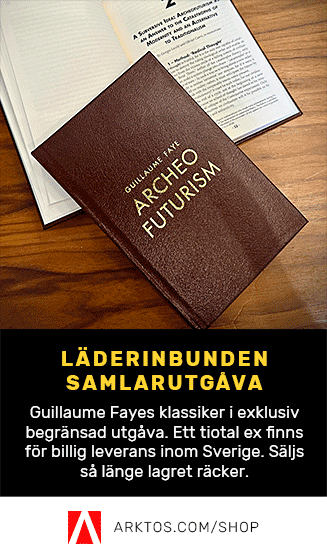Vår tidsepok är en era av dystopier, av tänkare som målat upp mardrömsvisioner av vart historien kan vara på väg. En sådan dystopi är Nietzsches ”sista människa”, en ras av människor som gjort sig av med all vilja till liv, all vilja att ta risker, all vilja att lämna det bekväma livet bakom sig. En ”civilisation” som är mot all vilja att vara unik, att vara sann mot den man är, mot insikten att det finns skillnader mellan olika människor. Man känner med en rysning igen många drag från vår egen samtid när man läser om dessa sista människor, en människa som är lycklig när han eller hon får titta på Idol och slipper läsa om otäcka saker i sin dagstidning. En människa som kommer att ropa på förbud så fort han ser en ”kamphund” eller läser en otäck ”främlingsfientlig” insändare. Den ”sista människan” är en naturlig följd av den egalitära ideologins strävan efter likhet, och den nihilism som för tillfället driver våra samhällens utveckling. Det enda motgiftet är att återföra den europeiska människan till vårt faustiska projekt, vår heroiska livssyn, och en antiegalitär världsåskådning. Annars kan framtiden, tills de utplånas av mer livskraftiga folk, tillhöra den ras om vilken Nietzsche skrev:
Alas, the time is coming when man will no longer give birth to a star. Alas, the time of the most despicable man is coming, he that is no longer able to despise himself. Behold, I show you the last man.
’What is love? What is creation? What is longing? What is a star?’ thus asks the last man, and blinks.
The earth has become small, and on it hops the last man, who makes everything small. His race is as ineradicable as the flea; the last man lives longest.
’We have invented happiness,’ say the last men, and they blink. They have left the regions where it was hard to live, for one needs warmth. One still loves one’s neighbor and rubs against him, for one needs warmth…
One still works, for work is a form of entertainment. But one is careful lest the entertainment be too harrowing. One no longer becomes poor or rich: both require too much exertion. Who still wants to rule? Who obey? Both require too much exertion.
No shepherd and one herd! Everybody wants the same, everybody is the same: whoever feels different goes voluntarily into a madhouse.
’Formerly, all the world was mad,’ say the most refined, and they blink…
One has one’s little pleasure for the day and one’s little pleasure for the night: but one has a regard for health.
’We have invented happiness,’ say the last men, and they blink.”
from Nietzsche’s Thus spoke Zarathustra, p.3,4,5, Walter Kaufmann transl.













